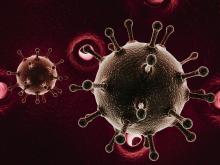Prenatal tenofovir didn’t reduce the rate of hepatitis B among infants born to women infected with the virus.
Among 322 6-month-olds, the rate of HBV transmission was 0 in those whose mothers received the antiviral during pregnancy and 2% among those whose mothers received placebo – not a statistically significant difference, Gonzague Jourdain, MD, and his colleagues reported in the New England Journal of Medicine.
All of the infants in the study, who were born in Thailand, got hepatitis B immune globulin and began a 5-dose HBV vaccination schedule within the first few hours after birth, something that “may have contributed to the low rate of HBV transmission that was observed” in the study, said Dr. Jourdain, a visiting scientist at the Harvard School of Public Health, Boston.The study randomized 331 pregnant women with proven HBV infections to either tenofovir or placebo from 28 weeks’ gestation to 2 months post partum. All infants received HBV immune globulin at birth, and HBV vaccine at birth and at 1, 2, 4, and 6 months. The primary endpoint was confirmed HBV infection in the infant at 6 months.


